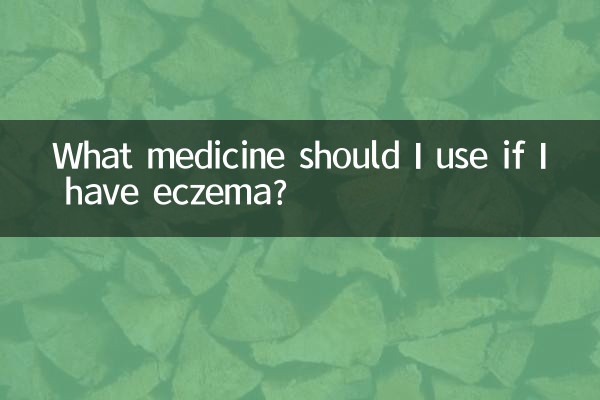What medicine should I use if I have eczema?
Eczema is a common skin inflammation that manifests as redness, swelling, itching, scaling, and even exudation and scabs in severe cases. Recently, there has been a lot of discussion on the treatment of eczema on the Internet, and many patients are looking for effective drug treatments. This article will combine the hot topics and hot content in the past 10 days to introduce you to the drug treatment of eczema in detail and provide structured data for reference.
1. Common symptoms of eczema

Symptoms of eczema vary from person to person, but usually include the following:
| symptom | describe |
|---|---|
| Itchy skin | Persistent itching of the affected area, especially at night |
| Red and swollen skin | Redness and swelling of the affected skin |
| Desquamation | Dry, peeling skin |
| Drainage and scabbing | In severe cases, exudation may appear in the affected area, and scabs may form after drying. |
2. Common drug treatments for eczema
According to recent popular discussions and medical recommendations, drug treatments for eczema mainly include the following categories:
| drug type | Representative medicine | effect | Applicable situations |
|---|---|---|---|
| topical corticosteroids | Hydrocortisone, triamcinolone acetonide | Anti-inflammatory, anti-itching | Mild to moderate eczema |
| topical calcineurin inhibitor | Tacrolimus, pimecrolimus | Anti-inflammatory, immune modulation | Eczema on face or sensitive areas |
| Oral antihistamines | Loratadine, Cetirizine | relieve itching | When itching is severe |
| moisturizer | Vaseline, urea ointment | Moisturize and repair skin barrier | daily care |
3. Precautions for eczema treatment
1.Avoid overuse of hormone creams:Long-term use of powerful hormones may cause side effects such as skin thinning and pigmentation, and should be used rationally under the guidance of a doctor.
2.Pay attention to moisturizing:Eczema patients have impaired skin barrier function, and moisturizing is an important part of treatment. It is recommended to apply moisturizer multiple times a day.
3.Avoid scratching:Scratching can aggravate skin damage and even lead to infection, so it should be controlled as much as possible.
4.Look for triggers:The onset of eczema may be related to factors such as allergies, stress, environment, etc. Finding triggers and avoiding them as much as possible can help control the condition.
4. Recent hot topics: natural treatments for eczema
There has been a lot of buzz recently about natural treatments for eczema. Many netizens shared their experiences using oatmeal baths, coconut oil, aloe vera and other natural ingredients to relieve eczema symptoms. However, it should be noted that these methods may be effective for some people, but there is a lack of scientific evidence to support it, and patients with severe eczema should still rely on drug treatment.
| naturopathy | How to use | Effect evaluation |
|---|---|---|
| oatmeal bath | Add oatmeal powder to warm water and soak in it | May relieve itching |
| coconut oil | Apply directly to the affected area | May moisturize, but has limited effectiveness |
| aloe vera | Apply aloe vera gel | May soothe skin |
5. Summary
Treatment of eczema requires choosing the right medication based on the severity of the condition and individual circumstances. Mild eczema can be controlled with topical steroid ointments and moisturizers, while moderate to severe eczema may require a combination of oral medications or other treatments. At the same time, maintaining good living habits and mentality can also help with the recovery of eczema. If the symptoms persist and do not relieve, it is recommended to seek medical treatment in time and receive treatment under the guidance of a professional doctor.

check the details

check the details